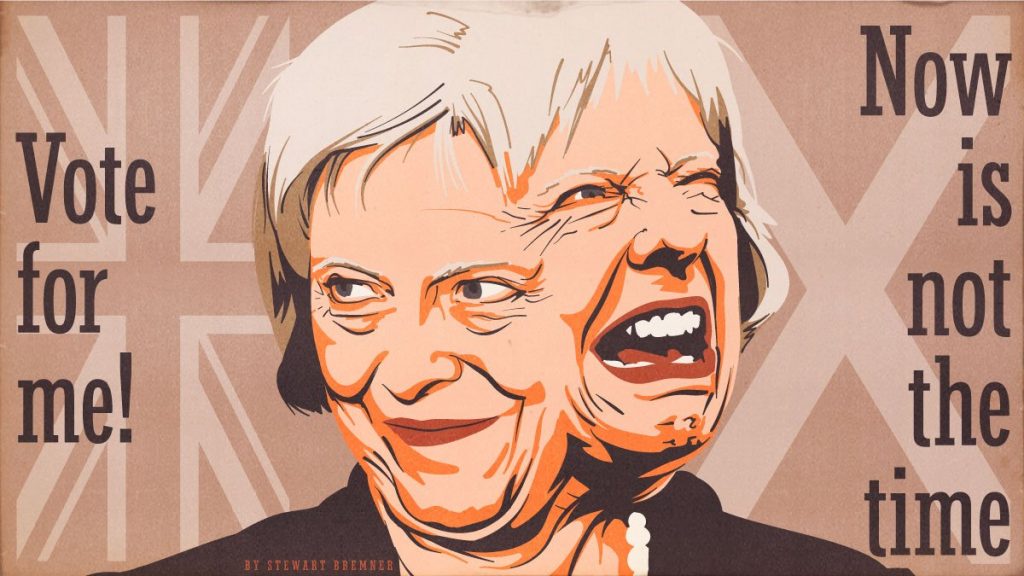Stability for the Precariat?


If a week is a long time in politics a lifetime must seem interminable. Yet for Theresa May, so anxious to ramp up a mood of crisis around her deeply personalised General Election contest, this is the most important vote in 60 years.
The Prime Minister is correct in holding this view. The central tenets of British politics have been torn up and in their place sit irreconcilable factions. Such a situation, coupled with an impending sense of economic and geopolitical decline, has not been seen since at least the 1970s.
Ever since the morning when Britain woke up to Brexit, there has been a strange sense of dread haunting the UK: of the mounting difficulty of a task that no one wants to really grapple with, and of sheer awe at the vast scale of what it all means.
All of this is accompanied by a studied indifference: a nation-wide shrug that this great dislocation is now a process in motion which, like ageing, is as undeniable as it is unavoidable.
That indifference is now being harnessed as a political tool. There has been no great surge of interest in the prospects of Brexit, no chatter in the streets about the new global Britain, no optimistic zeal for the start of a new project. But there is a desire to get it all over with.
May’s electoral gamble is premised on a sense that people are fed up with choice, with the consideration of alternatives, and that they want stability above all else. This underpins the generational significance of what happens on 8th June.
The “strong and stable leadership” pitch divides the old from the young more than it divides Remainer and Leaver. It is an appeal to deference and to those generations who still benefit from the fruits of the post-war settlement. The concept of strength and stability, to the precariat generation, is absurd. It is the opposite of everything that their experience adds up to.
But their quiescence can no longer be taken for granted, because May has called time on the post-Thatcher compromise. The deal went something like this – in exchange for a lack of stability, you will have access to a broader range of freedoms. Though scarcely the basis for a social contract, this trade-off held firm over three decades.
“The “strong and stable leadership” pitch divides the old from the young more than it divides Remainer and Leaver. It is an appeal to deference and to those generations who still benefit from the fruits of the post-war settlement. The concept of strength and stability, to the precariat generation, is absurd. It is the opposite of everything that their experience adds up to.”
Gone was the old hierarchically ordered world of work and its drudgery. Gone was the vocation selected in adolescence to be pursued uninterrupted until retirement or the grave. Individuals became empowered to make all manner of choices: from what they consumed, to how they dressed. From where they holidayed, to how they expressed a range of identities freed from the old constraints by the cultural and sexual revolutions of the 1960s.
Some of these freedoms may be unshakeable. Certainly, technology has expanded the field exponentially. But the existence of any freedom is, fundamentally, political.
Thus the significance of May’s project lies in its contention that a public will sometimes willingly exchange certain freedoms for a quiet life.
Following through with Brexit rests on a promise to tear up the post-Thatcher deal in the name of strength, stability and nostalgia. The European question was really just a proxy: a convenient tag for widespread guilt and shame that a generation who never had it so good ended up with such little interest in collectively re-establishing the conditions that forged equality out of post-war austerity.
It has been observed that millennials may lack affordable houses, careers, communities and political agency, but at least they had freedom of movement. Britons of all ages and classes may have lost the old social fabric that bound them together, but for a quarter of a century, they gained a continent. As the door slams shut on that web of connections and possibilities, the patchwork affair of residual British national solidarity feels cold and threadbare. A meagre inheritance by anyone’s standards.
But people without fixed identities, stability or a sense of community are notoriously difficult to control.
When Nixon mobilised middle America in the late sixties around the freshly minted term of the “silent majority” he was not the first (and certainly not the last) to sell a fiction that global processes can be reversed through a return to a nostalgic vision of a neatly ordered past.
That attempt at cultural counter-revolution failed, even though it was only seeking to turn the clock-back a relatively modest ten years.
This notional right of return to the past, this demand from an ageing population to re-live a long lost youth, is probably an inevitable political tendency in any rapidly changing society.
But this time the stakes are higher. Today, Brexit is just a localised instance of the great question that all societies have to grapple with, as globalisation enters yet another phase of instability.
The questions being posed cannot be understated. Are we to live in terms that are singular, or plural, individual, or collective? Will the coming century usher in an order based on lines as straight, neat and brutal as the 32nd Parallel, or a world of complex, shifting patterns?
As the Prime Minister may be about to discover in the wake of next month’s vote, attempting to neatly arrange the affairs of these sprawling, gloriously diverse, islands could drown the whole clanjamfrie.

A well distanced perspective of a society in turmoil.
Thanks Chris
A well distanced perspective of a society in turmoil.
Thanks Chris